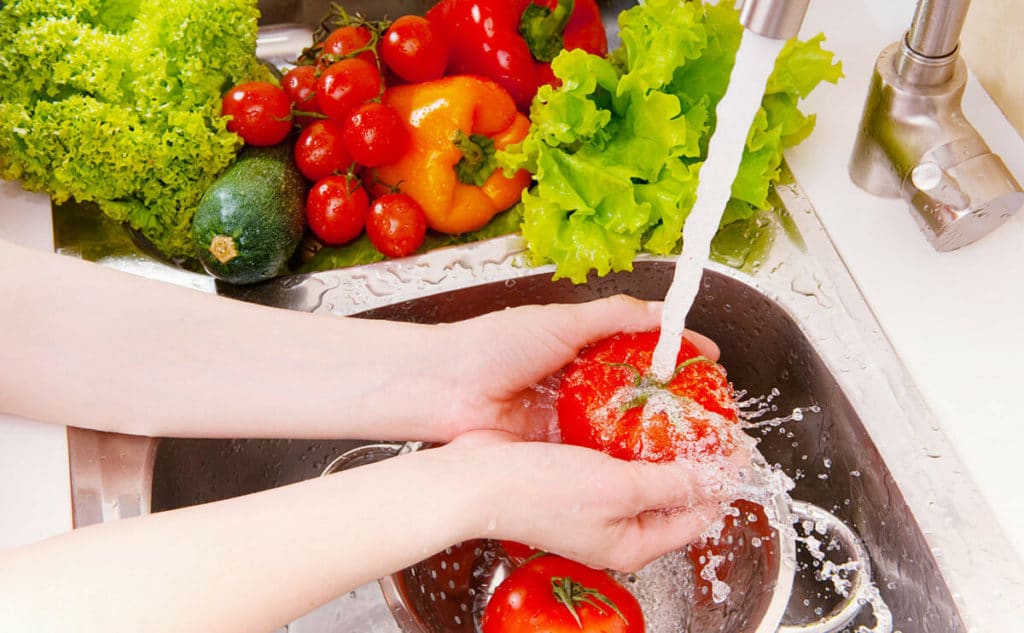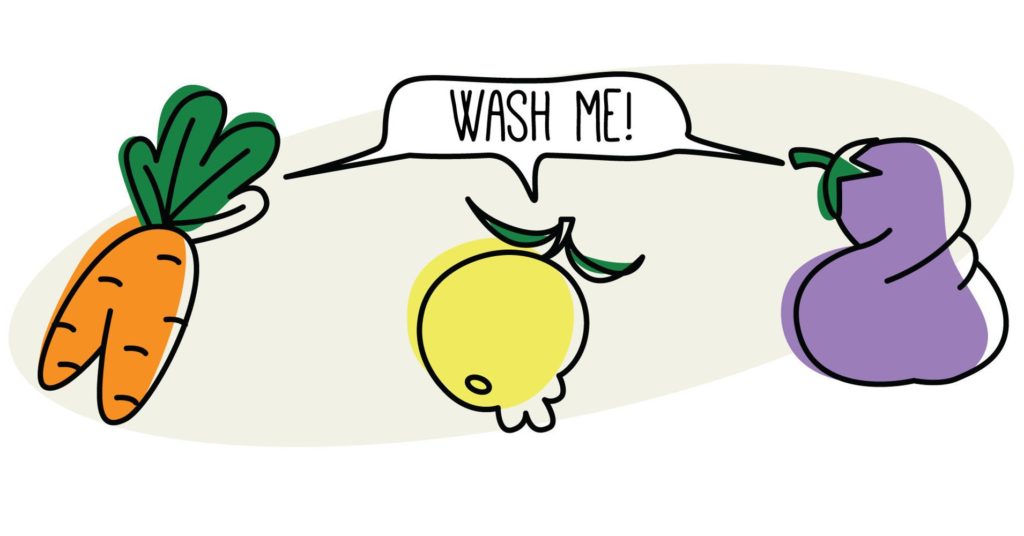Prepare for the Covid-19 virus: How to clean your fresh fruits and vegetables to stay safe
After reading Brenda Langdon’s excellent article about the Covid-19 virus and sensible precautions everyone can take to stay healthy I’d like to repost my column about food safety.
One of the best reasons for living in Cuenca is the variety of vegetables and fruits, the freshness and the cost.
Last year we visited Florida, “The Sunshine State,” and found that so much of the produce was imported from Mexico and South America. Although some was raised locally, boy, did we have sticker shock! One pineapple for… five dollars! A large red mango… two dollars!
But never take a bite out of that juicy peach or snag a grape without washing first. If you’re eating street food, you might think twice about grabbing a slice of that juicy piña. Besides washing off any dirt and grime, you want to get rid of any microbes and, importantly, pesticides.

Ambato, Ecuador, December 20, 2017: Ecuadorian woman fruit seller in front of her displays of tropical fruits in a market
I’m a member of the Facebook group ‘Food & Cooking In Ecuador’ and member Kathie S. called our attention to a new study published in the American Chemical Society. The scientists showed that soaking produce in baking soda removes more pesticide residue than washing with regular water alone. Importantly, they tested pesticide residue that was below the skin, into the fruit itself. Even if you’re buying organic produce only, this could be a healthy addition to your safe kitchen.
But here in Cuenca, isn’t it difficult to find baking soda? Well…yes, food grade baking soda is difficult to find, but ‘bicarbonato’, which is not ‘food grade’ baking soda (you would not cook with it) is easily found in the cleaning aisle of Supermaxi and in the mercados. And it’s perfect to use as a produce cleaner — just be careful to rinse your produce well after soaking.
Writing for Huffpost.com, nutritionist Karina Heinrich reminds readers that the most important reason for thoroughly cleaning produce before eating is to avoid foodborne illnesses. In the United States, 48 million people get sick from contaminated food each year. She says, “The goal with washing is to decrease bacteria and prevent any illnesses, such as E. coli.”
She suggests washing your produce just prior to eating or preparing — don’t wash and then refrigerate because that creates “a perfect, wet habitat for bacteria to grow.” Also, washing and storing in the refrigerator encourages mold and the produce goes bad more quickly.
The study had best results by dissolving approximately two teaspoons of bicarbonato in a quart of clean tap water (four cups or about a liter) and soaking the produce for 15 minutes, then rinsing well under running tap water.
Heinrich suggests that soft and delicate fruits like raspberries may get too soggy if you soak them that long, so use the solution, but only for a couple of minutes, then rinse well and pat dry with paper towels.
Always wash your own hands with soap and water before handling! This ensures that any bacteria on your hands won’t contaminate your produce. Then follow that sacred rule to avoid cross-contamination — use separate cutting boards for your produce and meats, especially for chicken. Be sure to wash them thoroughly after using. Read more from the Academy of Nutrition & Dietetics here.

The University of Maine Cooperative Extension advises:
- Wash your hands with hot soapy water before and after preparing food.
- Clean your countertop, cutting boards, and utensils after peeling produce and before cutting and chopping. Bacteria from the outside of raw produce can be transferred to the inside when it is cut or peeled. Wash kitchen surfaces and utensils with hot, soapy water after preparing each food item.
- Do not wash produce with soaps or detergents.
- Use clean potable cold water to wash items.
- For produce with thick skin, use a vegetable brush to help wash away hard-to-remove microbes.
- Produce with a lot of nooks and crannies like cauliflower, broccoli or lettuce should be soaked for 1 to 2 minutes in cold clean water.
- Some produce such, as raspberries should not be soaked in water. Put fragile produce in a colander and spray it with distilled water.
- After washing, dry with a clean paper towel. This can remove more bacteria.
- Eating on the run? Fill a spray bottle with distilled water and use it to wash apples and other fruits.
- Don’t forget that homegrown, farmers market, and grocery store fruits and vegetables should also be well washed.
- Once cut or peeled, refrigerate as soon as possible at 40ºF or below.
- Do not purchase cut produce that is not refrigerated.
Finally, what about produce that is labeled “double” or “triple washed?” Foodsafety.gov says that manufacturers are good about thoroughly washing produce and it should be safe to eat if it carries that label — and supermarkets like Supermaxi in Cuenca carry salad and vegetables and even cut fruit labeled prewashed. However, you can choose to re-rinse “pre-washed” produce if you wish, just be sure to do your washing in a clean sink.

Sources:
Academy of Nutrition & Dietetics. Cutting Board Safety.
Chemical & Engineering News. Baking soda washes pesticides from apples.
Foodsafety.gov. How to handle ready-to-eat bagged produce.
The Huffington Post. Exactly how to wash your fruits and vegetables, according to the experts.
_________________________
Susan Burke March, a retired Registered and Licensed Dietitian, specializes in smart solutions for weight loss and diabetes-related weight management, and a Cuenca expat. Contact her at SusantheDietitian@gmail.com





















